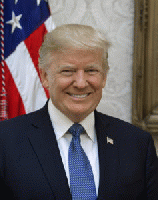
Official portrait of President Donald J. Trump taken Oct. 6, 2017.
(Image by (Official White House photo by Shealah Craighead)) Details DMCA
As Greenwald noted, "So numerous are the false stories about Russia and Trump over the last year that I literally cannot list them all."
The phenomenon began in the weeks after Trump's shocking victory over Hillary Clinton as Democrats and the mainstream media looked for people to blame for the defeat of their much-preferred candidate.
So, on Thanksgiving Day, just weeks after the election, The Washington Post published a front-page story based on an anonymous group called PropOrNot accusing 200 Web sites of acting as propaganda agents for Russia. The list included some of the Internet's leading independent news sources, including Consortiumnews, but the Post did not bother to contact the slandered Web sites nor to dissect the dubious methodology of the unnamed accusers.
Apparently, the "crime" of the Web sites was to show skepticism toward the State Department's claims about Syria and Ukraine. In conflating a few isolated cases of "fake news" in which people fabricated stories for political or profitable ends with serious dissent regarding the demonizing of Russia and its allies, the Post was laying down a marker that failure to get in line behind the U.S. government's propaganda on these and other topics would get you labeled a "Kremlin tool."
As the Russia-gate hysteria built in the run-up to Trump's inauguration during the final weeks of the Obama administration, the Post also jumped on a claim from the Department of Homeland Security that Russian hackers had penetrated into the nation's electrical grid through Vermont's Burlington Electric.
As journalist Gareth Porter noted, "The Post failed to follow the most basic rule of journalism, relying on its DHS source instead of checking with the Burlington Electric Department first. The result was the Post's sensational Dec. 30 story under the headline 'Russian hackers penetrated U.S. electricity grid through a utility in Vermont, U.S. officials say.'
"The electric company quickly issued a firm denial that the computer in question was connected to the power grid. The Post was forced to retract, in effect, its claim that the electricity grid had been hacked by the Russians. But it stuck by its story that the utility had been the victim of a Russian hack for another three days before admitting that no such evidence of a hack existed."
The Original Sin
In other cases, major news outlets, such as The New York Times, reported dubious Russia-gate claims from U.S. intelligence agencies as flat fact, rather than unproven allegations that remain in serious dispute. The Times and others reported Russian "hacking" of Democratic emails as true even though WikiLeaks denied getting the material from the Russians and the Russians denied providing it.
For months into 2017, in dismissing or ignoring those denials, the U.S. mainstream media reported routinely that all 17 U.S. intelligence agencies concurred in the conclusion that Russia was behind the disclosure of Democratic emails as part of a plot initiated by Russian President Vladimir Putin to help elect Trump. Anyone who dared question this supposed collective judgment of all the U.S. intelligence agencies risked being called a "conspiracy theorist" or worse.
But the "consensus" claim was never true. Such a consensus judgment would have called for a comprehensive National Intelligence Estimate, which was never commissioned on the Russian "hacking" issue. Instead there was something called an "Intelligence Community Assessment" on Jan. 6 that -- according to testimony by President Obama's Director of National Intelligence James Clapper in May 2017 -- was put together by "hand-picked" analysts from only three agencies: the CIA, FBI and National Security Agency.
Even after Clapper's testimony, the "consensus" canard continued to circulate. For instance, in The New York Times' White House Memo of June 25, correspondent Maggie Haberman mocked Trump for "still refus[ing] to acknowledge a basic fact agreed upon by 17 American intelligence agencies that he now oversees: Russia orchestrated the attacks, and did it to help get him elected."
Finally, the Times ran a correction appended to that article. The Associated Press ran a similar "clarification" applied to some of its fallacious reporting which used the "17-intelligence-agencies" meme.
After the correction, however, the Times simply shifted to other deceptive wording to continue suggesting that U.S. intelligence agencies were in accord on Russian "hacking." Other times, the Times just asserted the claim of Russian email hacking as flat fact. All of this was quite unprofessional, since the Jan. 6 "assessment" itself stated that it was not asserting Russian "hacking" as fact, explaining: "Judgments are not intended to imply that we have proof that shows something to be a fact."
Even worse than the Times, the "fact-checking" site Politifact, which is part of Google's First Draft Coalition for deciding what the search engine's algorithms will promote as true and what information will be disappeared as false, simply decided to tough it out and continued insisting that the false "consensus" claim was true.
(Note: You can view every article as one long page if you sign up as an Advocate Member, or higher).





